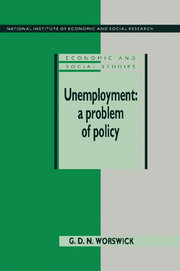Book contents
- Frontmatter
- Contents
- List of tables
- List of charts
- Preface
- 1 INTRODUCTION
- 2 CONCEPTS AND MEASUREMENTS
- PART 1 STRUCTURAL CHANGE
- PART 2 THE WAGE QUESTION
- 8 WAGES AND EMPLOYMENT
- 9 WAGE SUBSIDIES
- 10 PROFIT SHARING
- 11 INCOMES POLICY
- PART 3 MACROECONOMIC POLICY
- PART 4 INTERNATIONAL DIMENSION
- Appendix to Chapter 8: The puzzle of the apparent fall in United States real wages
- Notes
- List of works cited
- Index
- THE NATIONAL INSTITUTE OF ECONOMIC AND SOCIAL RESEARCH PUBLICATIONS IN PRINT
9 - WAGE SUBSIDIES
from PART 2 - THE WAGE QUESTION
Published online by Cambridge University Press: 06 July 2010
- Frontmatter
- Contents
- List of tables
- List of charts
- Preface
- 1 INTRODUCTION
- 2 CONCEPTS AND MEASUREMENTS
- PART 1 STRUCTURAL CHANGE
- PART 2 THE WAGE QUESTION
- 8 WAGES AND EMPLOYMENT
- 9 WAGE SUBSIDIES
- 10 PROFIT SHARING
- 11 INCOMES POLICY
- PART 3 MACROECONOMIC POLICY
- PART 4 INTERNATIONAL DIMENSION
- Appendix to Chapter 8: The puzzle of the apparent fall in United States real wages
- Notes
- List of works cited
- Index
- THE NATIONAL INSTITUTE OF ECONOMIC AND SOCIAL RESEARCH PUBLICATIONS IN PRINT
Summary
From time to time, and in different ways, the existing system of wage and price determination has been seen as an obstacle to full employment. Among remedies, wage or employment subsidies have been proposed. They were advanced in the interwar years, and interest in them has revived with the return of high unemployment in more recent years. The proposals have ranged from a general subsidy to all employment, to marginal subsidies to extra workers employed.
There has been comparatively little practical experience in this field in postwar Britain. The most interesting case, probably, was the Regional Employment Premium, which was introduced in the late 1960s, and although it may have had some effects (see Chapter 6, p. 59) it was phased out in the early 1970s. We shall not, however, attempt any comprehensive survey of practical measures applied in Britain, or elsewhere, nor of the many schemes of this kind which have been proposed. We will simply pick out some of the main proposals with a view to exposing their varying theoretical underpinnings, and pointing to some of the practical problems they raise.
The chapter on wage subsidies incorporated in the third edition of Pigou's Economics of Welfare in 1928, may be said to be the classic exposition of the classical view on the subject. It starts with a closed economy, with a homogeneous labour force of x + h workers, of whom x. are employed at a wage w.
- Type
- Chapter
- Information
- Unemployment: A Problem of PolicyAnalysis of British Experience and Prospects, pp. 104 - 108Publisher: Cambridge University PressPrint publication year: 1991

